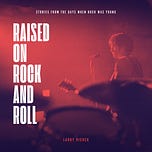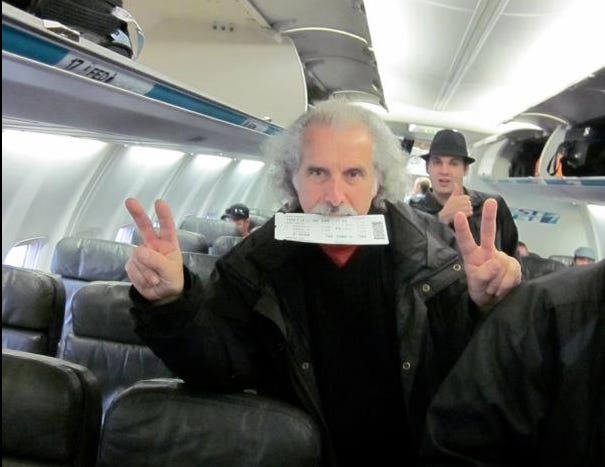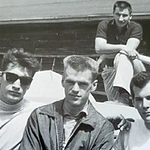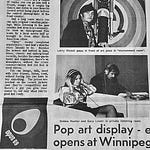Raised on Rock and Roll – stories from the days when rock was young, and my hometown Winnipeg was the rock and roll centre of Canada.
Marty Kramer: I was the kind of guy that my parents were old school and they said, Oh, guess what? We've got an instrument for you. We're going to give you lessons – violin. Great. So I said look, Dad, I don't want to play the violin. He said you're gonna play the violin. In those days, you never bought the violin. We rented it. I used to go for lessons at a music store on MacPhilips and Aberdeen or something, in a building. I go there, I hated it. He dropped me off. And then he'd go away and an hour later he comes back. Well, I knew if I didn't go in, I'd be in big trouble. So I went in, I'd sit there, your teacher was very good. They show you how to resin the bow and hold it under your chin and start he and all this and that wasn't for me. I think I lasted… one for sure. maximum two lessons. That was it. No more violin. Then I watched these guys playing guitar. I watched these guys playing drums. And of course, they're honing their skills. I wasn't really looking for, nor were they looking for, somebody to join their band. They were looking for somebody to get them sort of exposed and get out there making money.
Meet Marty Kramer – ex-violinist and soon to be go-to band manager, tour manager, artist manager – for anybody who’s anybody, or wants to be.
One thing led to the other, I started talking to guys who were in bands or wanted to be in bands. And I said, Well, look, maybe I can get you into our school. I talked to the social committee, this that, next thing I know, I'm the guy that sort of placing the bands in a two or three mile radius at the schools and everything. Then I found out that the churches had halls and that they could provide the same type of thing. So when you could offer an agenda to the school guys – that on a Friday they could strut their stuff, on a Saturday, maybe even a Sunday afternoon in the park or something – you ended up getting all these phone calls. And hey, what's what.. and I can remember working bands for $5, the band playing for five hours, me getting 10% of $5, which was 50 cents. Now 50 cents in those days when you got $1 on the weekend allowance from your parents 50 cents was good. You were making money.
So if I worked Friday and Saturday, being around hanging around with these guys doing their thing with them, not playing musical instruments or anything just being there, guess what? I was the big shot. I was the go-to guy, Marty'll do this, Marty'll do that for you. He'll get you a booking. So it unfolded. Before I knew it. I had a small roster of guys that were musicians, I was going to their house for rehearsing and this and that, and you ended up getting a commission. I also had a driver's license, which a lot of these guys didn't. I also had an uncle who owned a rental company in Winnipeg. So thus I could rent a van. This was big, because you'd have to put all your stuff in cars or in trunks of cars and station wagons, and trailers. Well, when I showed up with a panel truck, and we could load everything in there, wow, and I could drive. And two of them could sit with me because they had a bench seat. And the others could go with a father or a parent and drive them to the gig. This was the do-all be-all in those days. And thus, I met my very first encounter with anybody that I thought could cut it, was Burton Cummings.
As I said earlier, five bucks for a band was a lot of money. With my commission – my commission of 50 cents – after the show we used to go and I could buy a hotdog, chips, a drink, one bubble gum and two licorice, one red, one black, for 50 cents. And that's the God's truth. Now, on a good night, on a good night, Burton Cummings would say – when we were getting our food at the drive-in restaurant – he would order gravy on his fries. That was five cents extra. Well I didn't have that five cents. Remember, it was five bucks. I took 50 cents. There was five guys. Each one of those guys got 90 cents. So they were ahead of me by 40 cents. On a good night, Burton would say – he’d spent 55, he’d say ‘Put gravy on Kramer’s fries too and I'll pay for it. So he ended up paying 60 cents out of his 90 and I ended up getting a gravy on my fries.
So that was my first introduction. And then, from that point on, I just stuck with Burton. The Deverons evolved. I became the manager of the Deverons. I did the Deverons for as long as it stayed in existence, and then with Burton leaving the Deverons to go to the Guess Who, then I was introduced to a different ballgame with Randy Bachman. Garry Peterson, Jim Kale, Bob Ashley – the original guys minus Chad Allan. So Chad took a backseat, Burton stepped in, and from then on, it's been a ride of a lifetime. 27 years with Burton 27, 20 years with Randy.
Even before going into the business full-time, Marty was working with Winnipeg’s top booking agents – as a go-fer, chauffeur, or part of the show crew – for virtually every major artist passing through town. From Liberace to Led Zeppelin, from Roy Orbison to the Monkees. Fats Domino to the Rolling Stones. For a lot of these events, he made little or no money. He loved the music, he loved the people, he loved the action. By the time he moved to Vancouver in 1979 – still working with Burton Cummings, now at the height of his solo career – Marty knew everybody – artists and their managers, booking agents, promoters across North America. And more important, everybody knew him. He was still the go-to guy and he knew each and every facet of the trade.
Here's what I do on any given day – as a tour, band, artist, manager – any of those hats, or all of those hats. So, here's what I do. Contact the artists, the band, once a show or tour is confirmed. That's number one. Number two, hire the band and determine the salaries and the per diems for everybody – salaries meaning what they get paid, per diems meaning cost of living each day for food allowances and so on. Compile the tour budget, which includes all costs, which includes me, sound, lights, buses, transportation, airfare, rooms, you name it. Compile song lists for each performer in the band – with, usually, the lead singer, in this case, Burton. Okay. Confirm a rehearsal date, time and place – because you have to rehearse when you’re going out – I’m talking of touring. Then, establish length of sets and running order of the performance. If there's multiple people on, if you're the headliner, which means you go on last, everybody that precedes you are opening acts. Book airfare, hotels, as well as rental vehicles, book rental gear, sound lights, instruments and technicians. Because we don't usually like to have to bring everything with us and schlep it across the countryside, predominantly. We would bring in the old days – Burton’s piano of course for that sound. The guys would bring their guitars, Garry would bring his drums, but for the most part, all the other amps and necessities, we booked them.
Make up set lists and tour itineraries for everybody and distribute them, so they know what they're doing. Transport performers to and from the rehearsals in the venues, which was me, I never let anybody else – I never let that band out of my sight. Nobody touched them. If somebody else picked him up and I didn't drive them, I was sitting in the passenger seat and the band was in the back.
Advance all the shows, with stage props, technical riders and showtimes, which means, I need to know the lighting configuration, I need to know how much power I need. I need to know how many men I have to come in. I need to know all the showtimes. I do all that. Then once we're on the road, contact all the venues we're playing at, and the hotels, to confirm everything. Compile rooming lists and distribute them, and the per diems. Once we're at the venue, assign the dressing rooms, see about the catering, staffing, conduct the soundcheck, which me ans you do a sound check with all your stuff. So there's a line check, which is just the instruments minus the artistry. Soundcheck is full-blown sound, everything is going, making sure it all works. Deal with the press media, guest lists such as yourself, merchandise, who’s coming – radio DJs, interviewers, guys writing books, guys wanting to take pictures, we got to sell shirts, got to do all that. Show time, till the end of show time, I'm in charge, and always there for the performers, band and techs. I'm always there. After the show a meet and greet, which is you, backstage passes, whatever, with performers, and sell merchandise. Then, tear down, take everybody back to the hotel, and do it again the next day. And at the end of the tour, pay everybody, fly or drive everybody home until the next time, and that is what Kramer does. On a daily basis. Every day.
– Okay. There’s only one thing I’m not hearing here: It was a ball, or, it was a living nightmare…
It was a living hell, because you never knew what you're up against. Whether it's the elements, whether it's weather, whether it's airport delays, whether it's vehicle breakdowns. The worst thing that can happen, of course, is accident and sickness. If you're on the road, it’s not like COVID where you get taken right out. But if you've got a flu… And fortunately, I can honestly say that in all the years that I worked with Burton – as the Deverons, as the Guess Who, as Burton Cummings – I only had two cancellations because he lost his voice. With the Guess Who reunion tour, we only had one because he lost his voice. And that's it. So that's pretty damn good. And everybody else – I’ve had all sorts of things happen. But like you say, it's not, oh, here's comes that guy, open the door for him. He's got that plush office, sit down, wine, women and song – you have to have your wits about you. If you're fucked up, excuse the language, and you're bent, this ain't gonna happen. It's gonna be a shit show. I have a meticulous record, I have a flawless record. I have never not started the show on time. I have never been a no-show. Unless the artist wasn’t able to show. I have always been there, even – I've been so far as to be ahead, waiting for the band to arrive on a flight, being at the venue waiting for them, to be driven to the airport to meet them, and getting a phone call from the band saying we missed our flight. We won't be there. And the shows in two hours. And we won't be there for four hours.
You want to talk about panic… There’s panic. Everything’s set up. Everything's ready to go. You can't let the cat out of the bag to everybody here. For sure you don't want to let the cat out to the media. For sure you don't want the patrons leaving, you've got a sold-out show. What do you do? So you scamper, you scamper like a madman. You try and find everything and anything in the vicinity that can come up on the stage. Because we never had an opening act. It was always just Burton. We never used an opening, for the most part. I’d get a local band and they’d come up and they play oldies for an hour and a half. Bonus! People thought Wow, what a show. Not only did we get Burton Cummings, we got a bonus. They didn't know that the band wasn't there, and that Burton wasn't even in town yet. He wasn't even on an airplane yet. And I got so that's the kind of stuff, that's the frenzy. You get crazy. You're pulling your hair out. I used to smoke cigarettes. It escalated – I stopped when I was 33 years old. I haven't smoked for 40 years. It escalated from, say for the sake of discussion, one to two cigarettes a day to 75 cigarettes a day. One in one ear, one in the other ear, package in my pocket, package on the table, talking to you smoking one after the other. And an ashtray with all the other ones still smouldering, while I'm lighting another one to talk to you. That's what those days used to be.
– You look back and at some point in there, you got involved with doing these 50 cent gigs. That changed your life, that made your life, everything you've done since then, right? Apart from your jobs, in that early period, that was all about music, I want your take on, your reflection back on, what music has done for you, to you and with you, all all this time.
Well it’s kept – that’s a good question, Larry. It's kept me in touch with today. It's kept me on the up and up. Following what I love best, with music. Of course as you said, Deverons first, realizing Burton’s potential as a vocalist, transitioning into the Guess Who, all those great songs, all those great concerts, all that time.
…Getting having the opportunity to write your own ticket, as you would say, no questions asked, to go all over the world, meet people like yourself, other people of prominence, other people of interest – pick and choose. Be able to control who you associated with. And then be able to come off the road and go back to a normal life. Cut your grass, water your plants, eat a home-cooked meal, be a normal Joe. And then tomorrow, get on a plane, land in the middle of nowhere, and start another crazy adventure.
I interviewed Marty in 2021. I spoke to him recently for an update, and true-to-form he gave me an earful. Sure enough he’s had a never-ending stream of crazy adventures. And the best news he passed on is that he’s sharing a ton of them in a new book. Road Boss draws from hundreds of those adventures, featuring some of the biggest name in rock and roll and beyond, each one of them told from Marty Kramer’s own one-of-a-kind perspective. Road Boss, co-written with Marty’s longtime friend and associate David Wolinski and published in Canada by Mosaic Press, will be unveiled at this year’s Frankfurt Book Fair, and it hits the bookshelves worldwide this October.
You’ve been listening to the Raised On Rock And Roll podcast. In this episode you heard musical excerpts from the Deverons, the Guess Who, and Burton Cummings. Taking us out – original music courtesy of Gord Osland and Steve Hegyi. I’m Larry Hicock.







